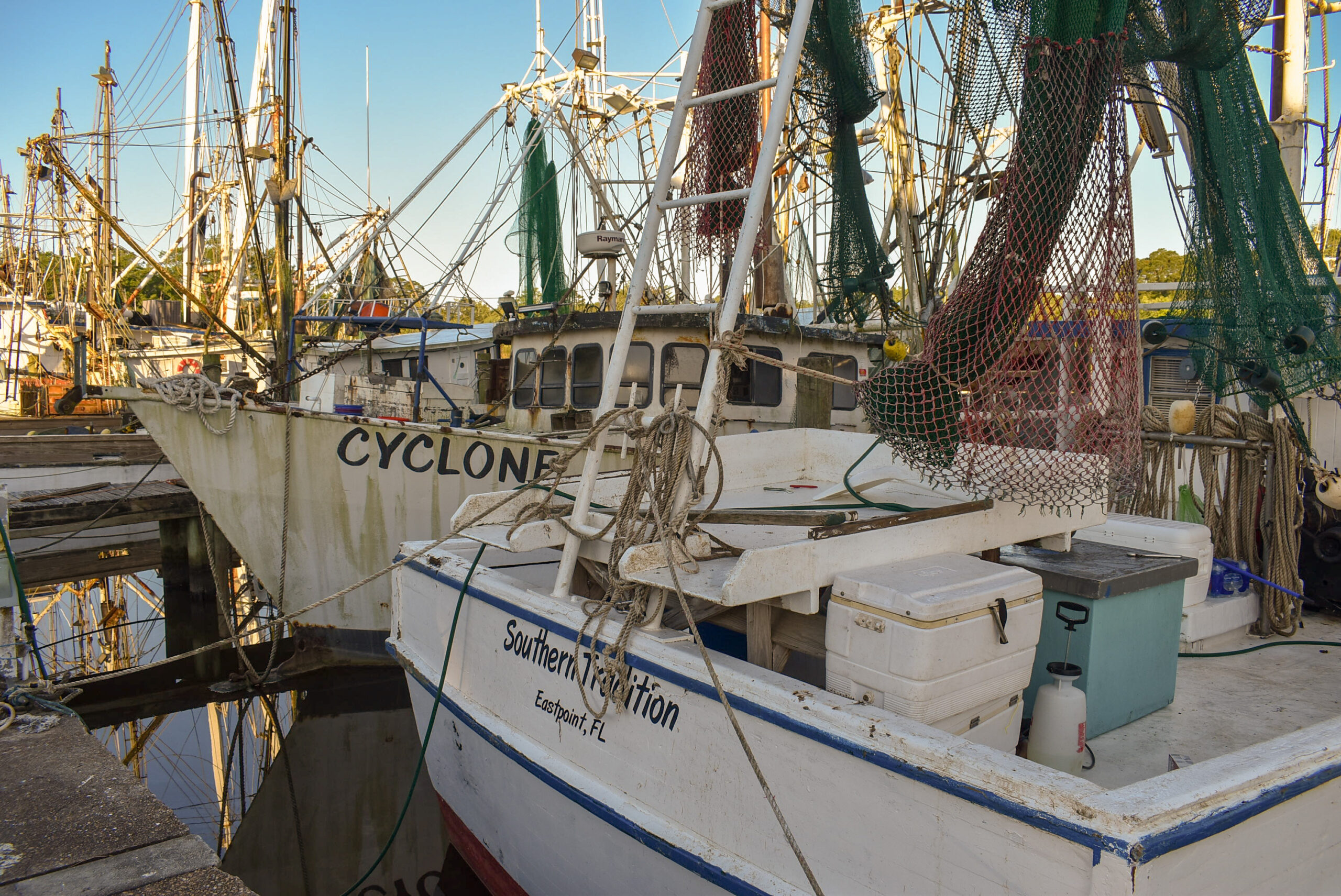How tariffs might affect domestic shrimp
The Trump administration’s latest round of tariffs are likely to have an effect on domestic shrimp production and prices, but to what extent, and in what way, still remains unclear.
Reese Antley, vice-president of operations for Wood’s Fisheries in Port St. Joe, said he believes it’s likely there will be an increase in prices for foreign-farmed shrimp, which make up the overwhelming share of America’s appetite for shrimp.
And that this will help boost the fortunes of the domestic industry, where there’s always been a large price discrepancy, making them less affordable for cost-conscious consumers.
But Steve Rash, owner of Apalachicola’s Water Street Seafood, said he’s less convinced that tariffs will have a significant effect on domestic shrimp production and pricing.
“It might, it’s hard to say,” he said. “The price is going up on everything.”
Rash said he believes the biggest factor affecting domestic shrimp prices is that it is based on high demand and low supply.
“Prices on domestic shrimp are going up irrespective of farmed shrimp,” he said. “The foreign are still way cheaper, even with a 10 percent tariff. The tariffs are certainly not going to make the prices go down, and if it has an effect, it will have a positive effect, but it might not have much effect at all.”
Antley, who has taken an active role on behalf of the American Shrimp Processors Association in the tariff issue, has testified several times before the U.S. International Trade Commission when it comes time for a sunset review of new tariffs and anti-dumping rules, particularly on imports from Ecuador, Thailand and India.
“We need protection, to at least make it a level playing field,” he said. “There are less boats catching shrimp, and shrimp prices were higher in the ‘90s than they are now.”
Antley sees the issue as broader than just prices, and believes the decline of the domestic shrimp industry has been hastened by other factors, such as environmental discrepancies and marketing flaws.
He said foreign countries frequently subsidize their shrimp farmers, where labor is cheap and energy prices are controlled. Antibiotics are used to address contamination in the water exchanging that occurs in unregulated countries.
“They’ve got to add salinity and antibiotics, and then they have to exchange the water and pump new water in,” Antley said. “The next guy is getting some of his waste, so you can imagine the water quality for farms down the line.
“There have been major disease issues, and there have been shrimp turned away from European ports,” he said. “We inspect less than 1 percent of shrimp coming into our country.”
Antley also has an issue with a failure to control how restaurants and retailers identify products as being Gulf shrimp, when the fact is 94 percent of the roughly 1.8 billion pounds of shrimp Americans consume annually are farm-raised overseas.
“You have restaurants, where the consumer doesn’t know that when menus say Gulf shrimp in reality they’re getting imported shrimp,” Antley said. “There are a lot of them that literally say Gulf shrimp and they’re produced in India and Ecuador. The restaurant association has done a wonderful job of keeping out country-of-origin labels.
“When they come to the coast they expect to get Gulf shrimp but that’s not what they’re getting,” he said.
Antley said he backs an effort by State Rep. Jason Shoaf in sponsoring Florida House Bill 1147 that would emulate the rules in Louisiana and crack down on any food establishment that misbrands or mislabels any wild or farm-raised fish in Florida, including shrimp.
The bill would also establish a Florida Wild Fish and Seafood Certification Program that would set harvest and packaging requirements, as well as compliance standards and certification protocols, for all wild-caught shrimp, taken, harvested, or landed in Florida.
“Most people think shrimp are shrimp and the consumer is not being educated,” Antley said. “There are some loyal people that know the difference. We have done so much on sustainability; we can be a specialty product.”
Rash said differentiating between domestic and foreign shrimp can be a two-edged sword, since he knows of customers that prefer the taste of the foreign variety, and others that strongly favor the domestic catch.
In the event that the tariffs remain in place and reap millions of dollars of revenue into the United States’ general budget, Antley said he would like to see those monies distributed back to the industry.
“We’ve fought to make sure tariffs went back to the industries affected,” he said. “It needs to go back to the industry, to the boats that operate on small margins.”
Antley said prices can be volatile so he declined to speculate on what the precise effect the boost in tariffs would have on shrimp prices at the retail and restaurant levels.
“There’s no way to tell yet,” he said, noting that foreign governments can moderate the effect on their shrimp producers’ prices by assisting them in other ways.


Meet the Editor
David Adlerstein, The Apalachicola Times’ digital editor, started with the news outlet in January 2002 as a reporter.
Prior to then, David Adlerstein began as a newspaperman with a small Boston weekly, after graduating magna cum laude from Brandeis University in Waltham, Massachusetts. He later edited the weekly Bellville Times, and as business reporter for the daily Marion Star, both not far from his hometown of Columbus, Ohio.
In 1995, he moved to South Florida, and worked as a business reporter and editor of Medical Business newspaper. In Jan. 2002, he began with the Apalachicola Times, first as reporter and later as editor, and in Oct. 2020, also began editing the Port St. Joe Star.